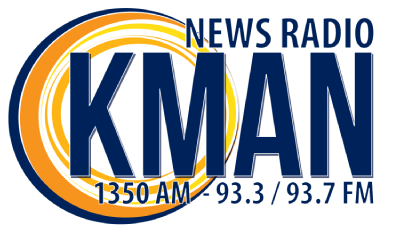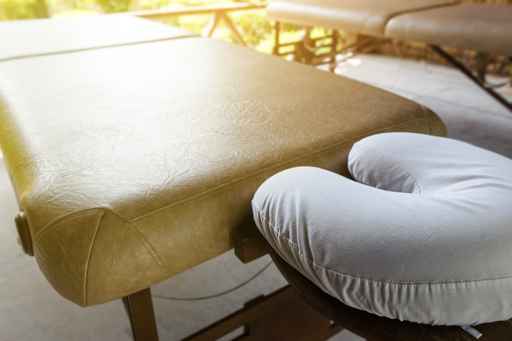The Manhattan City Commission gave initial approval of an ordinance requiring massage therapists to be licensed in order to practice in the city Tuesday. It passed first reading by unanimous vote.
Kansas is one of two states that does not license massage therapists, which has led multiple municipalities to pass their own ordinance requiring licenses. Riley County District Attorney Barry Wilkerson asked in 2018 that the city explore an ordinance to combat sex trafficking. Riley County police as well as some local practitioners have previously voiced support for licensing in some form during an October 2018 Commission work session.
Mayor Pro Tempore Usha Reddi says they wanted to be proactive with the ordinance.
“We don’t have a problem right now that we know of,” says Reddi. “But other cities do.”
Manhattan Assistant to the City Manager Jared Wasinger said at a meeting last week with massage therapist practitioners that they used the City of Olathe’s ordinance as a skeleton for their own, which they then altered following discussions with RCPD and local massage therapists.
If given final approval, massage therapy establishments as well as individual therapists would be required to apply for the license every two years at a cost of $200 for businesses and $75 for therapists. Additionally, a background check will cost applicants $20.
Under the law, licenses would not be issued to anyone under the age of 18, registered sex offenders, or anyone who had been convicted of a crime involving moral turpitude in the last five years. Those crimes include various forms of prostitution, child sexual abuse as well as adultery, sodomy and drug possession or sales.
Commissioner Jerred McKee was mostly supportive of the law, but wanted the portion regarding sodomy removed from the ordinance upon second reading.
“It’s a law the Supreme Court has invalidated, but there are people who still have convictions from it,” McKee says. “It was a law passed to persecute gay men, it’s not addressing what we’re trying to prevent here. While it likely will never affect anybody applying for a massage therapy license — language matters. Whether it’s buried in a paragraph or not — language matters.”
Also, athletic trainers in addition to those licensed through the state for cosmetology or the board of healing arts and engaged in practices regulated by those licenses will not need to be licensed through the city — unless they venture into massage therapy practices not regulated through their licenses.
Practitioners would be required to have a certain amount of education. They would need either a transcript showing 500 credit hours in a recognized massage therapy school, 150 hours in an accredited school as well as 12 hours of continuing education in the past 5 years and membership in a national massage therapy organization, or have passed the Massage and Bodywork Licensure exam (MBLEx) or the National Certificate of Therapeutic massage and Bodywork exam (NCTMB). For long-time therapists who have not undergone that education, they could provide a sworn statement from them and another practitioner that they have actively been practicing in the past 5 years.
They would have to show that they continued their education as well each time they renew their licenses. Therapists would have to provide proof of 12 hours of continuing education at an accredited organization or school or through a national organization.
Other regulations in the Manhattan ordinance would prohibit massage businesses from operating between midnight and 6 a.m. and serving alcohol (unless the establishment is part of a larger business such that serves alcohol and the alcohol is not permitted in the areas where massages occur). Registered operators would need to be on-site whenever business is occurring and a register of all appointments would need to be kept by both establishments and individual practitioners and be made available upon request by RCPD.
RCPD Director Dennis Butler says that they won’t be performing inspections frequently and that they’re not intended to be onerous, adding that they’ll more likely be following credible tips from the community.
“If we go in and they don’t have a registry available, that doesn’t mean we start going through the business, opening doors and doing an investigation,” Director Butler says. “We wouldn’t have the authority to do that absent of any other exigent information about a crime occurring.”
Multiple massage therapists spoke during public comment. Doug Sellers asked for administration to clarify policy on how inspections will be handled when clients are being served. Neil Horton also pointed out that licensed cosmetologists are exempt from the law, but not establishments, and asked that they both be exempt in that case. Michael Petillo was not supportive of the bill as proposed. He says that the ordinance is “unnecessarily punitive” to new therapists and doesn’t address the root of the problem.
“I strongly urge the city to establish a task force or working group built from a diverse pool of massage practitioners, police and city officials and perhaps even human trafficking experts to examine these issues further before implementing any regulatory ordinance,” Petillo says.
Mayor Mike Dodson says in order for the ordinance to be effective, “we’ve got to either have a state law or we’ve got together with [Riley County] and make sure we’re all singing off the same sheet of music.”
Commissioner Linda Morse added that they also need to work with Pottawatomie County, too, and she’d like to get Geary County in on licensing as well.
City administration will return the ordinance with edits for final approval. If passed, therapists and establishments would need to be licensed by August 1, 2019.


